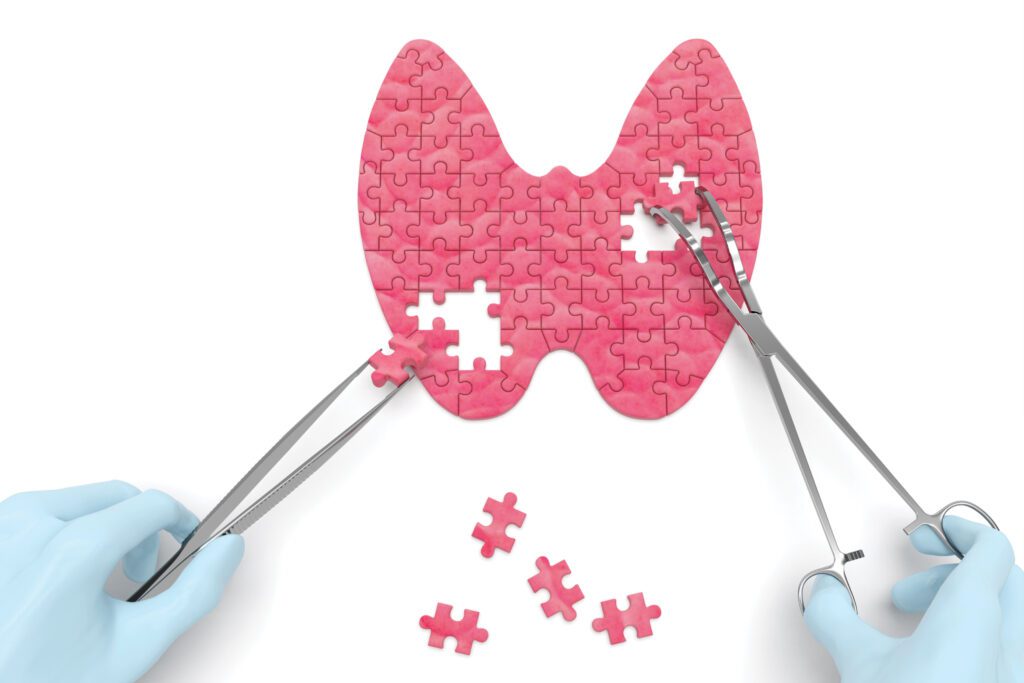What if all those things you feel powerless to overcome — moodiness, weight gain, lethargy — aren’t really your fault? Meet your thyroid! It’s the little gland that can put the brakes on your energy, your outlook, and the beat of your heart.
The butterfly-shaped thyroid is a small but vital gland in your neck that influences all your key organs – heart, brain, liver, kidneys, and skin – and keeps you feeling tip-top! According to Erin Martin, a family nurse practitioner with CHI Memorial Primary Care and Sports Medicine Associates, “The thyroid plays a major role in metabolism and growth of the human body. It helps to regulate many functions like body temperature by releasing hormones into the bloodstream.”
Sometimes though, it gets off kilter and you see changes, like bloating, tiredness, and moodiness: symptoms that don’t have you calling the doctor.


“Women sometimes have trouble recognizing symptoms of thyroid disease, which can lead to a delay in seeking medical attention and diagnosis,” says Dr. W. Heath Giles, a general and endocrine surgeon with University Surgical Associates. Instead, you chalk it up to aging, not enough exercise, or not getting to bed on time. In short, you blame yourself and don’t look for underlying culprits like this little workhorse, the thyroid.
Women are far more likely to be affected by thyroid disease than men, five to eight times to be exact, and the effects can cause issues with your menstrual cycle as well as problems during pregnancy and after delivery. Symptoms can also mimic those of menopause, although thyroid disease is more likely to occur after menopause.
Why do more women have thyroid disease?



In reality, our diet and exercise patterns play a much larger role than circulating levels of thyroid hormone."
Dr. Giles
While there’s speculation about the reasons more women than men develop thyroid disease, no unequivocal link has been established. “One correlation that’s been studied has been the relationship between thyroid disease and autoimmune diseases, which are more common in women than men. Other than that, we don’t know why more women face thyroid disease,” says Dr. Asma Khan, an endocrinologist with Erlanger. What is plain, though, is that one in eight women will have a thyroid issue, and almost 60% don’t know it. In fact, according to Dr. Giles, “Thyroid nodules are commonly identified by examination or imaging for another reason.” It’s easy to attribute feeling tired, depressed, or out-of-sync with the temperature as the result of something you are doing. But in fact, those traits all point to thyroid disease, and the combination of several should send you looking for an evaluation by an endocrinologist.
Weight fluctuations are commonly associated with thyroid disorders, but if you’ve noticed significant weight gain or loss, don’t immediately go blaming your thyroid.
Hypothyroidism vs. Hyperthyroidism
The two most common thyroid problems are hypothyroidism and hyperthyroidism. “Hypothyroidism is a condition in which the thyroid gland does not produce enough thyroid hormone, and your metabolism slows,” says Martin. This typically develops over a few years, and can cause fatigue, sadness or depression, joint pain, and cold intolerance. Hypothyroidism can also leave your skin itchy and dry, make your nails brittle, and even cause hair loss. And that bloating, constipation, and muscle weakness? It’s quite possible your thyroid is responsible for that too.
Women of childbearing years should be especially cautious when it comes to this powerful gland. What you think of as “pregnancy brain” – that lack of concentration and memory you often experience beyond nine months – can also be a symptom of an underactive thyroid.
Most often, hypothyroidism is caused by Hashimoto’s disease, an autoimmune disease that attacks the thyroid and reduces its ability to make hormones. Fortunately, man-made hormones can treat hypothyroidism and are considered quite safe for long-term use under the supervision of an endocrinologist.
“Hyperthyroidism, on the other hand, is a condition that causes the gland to make too much thyroid hormone,” says Martin. It speeds up your heart rate, leaves you feeling anxious, nervous, or irritable, can cause issues with sleep, and might make you feel hot when others are comfortable. In some instances, it also causes muscle weakness, increases your appetite, and can raise your risk for osteoporosis, especially in post-menopausal women. It may even affect your ability to get pregnant.
Graves’ disease, another autoimmune disorder, is often the culprit with hyperthyroidism. Treatments for this range from medicines to block excess hormone production or its effect to radioiodine or surgery to remove the thyroid.
Postpartum Thyroiditis
Another common thyroid disorder, postpartum thyroiditis is an inflammation of the thyroid after childbirth that mimics the symptoms of postpartum depression, or “baby blues.” Around 10% of women experience this, in one or even two phases.
The first phase begins shortly after childbirth, usually within one to four months, and may present symptoms of hyperthyroidism. Phase two begins four to eight months after giving birth and can last up to a year. Here, hypothyroidism symptoms are present, as most hormones have been lost from the damaged thyroid. This is one cause of those stubborn last few pounds that won’t go away after childbirth.
For most women who develop thyroiditis after birth, medications can slow down the rapid heart rate that comes in the first phase, and the majority of women will return to normal within 12 to 18 months. Unfortunately, if you’ve had postpartum thyroiditis before, your risk of having it again or it developing into permanent hypothyroidism is increased.



Women with a family history of thyroidism should pay particularly close attention if they start experiencing any of the symptoms, as autoimmune diseases cluster in families."
Dr. Asma Khan
Protecting Yourself
The best way to safeguard your thyroid health is to catch problems early. “The thyroid affects the whole body, so symptoms are often very general and easier to ignore,” says Dr. Khan. Many doctors have started checking the thyroid at routine appointments, but it’s not necessarily required. Therefore, if you recognize any symptoms, it’s important to mention them to your doctor. A simple blood test measuring thyroid stimulating hormone (TSH) can detect issues with the gland. “Women with a family history of thyroidism should pay particularly close attention if they start experiencing any of the symptoms, as autoimmune diseases cluster in families,” says Dr. Khan.
Lethargy, mood swings, bloating, anxiety, postpartum “blues:” the list goes on. Clearly, many traits women are more closely associated with such as depression and self-image problems could originate in a physical disorder that’s treatable. If you have some of these symptoms, make an appointment and find out if you’re one of the one in eight women who have thyroid disease. The fault may lie not in ourselves but in our glands.



Erin Martin
Family Nurse Practitioner, CHI Memorial Primary Care and Sports Medicine Associates



Dr. W. Heath Giles
General and Endocrine Surgeon, University Surgical Associates



Dr. Asma Khan
Endocrinologist, Erlanger Health System

